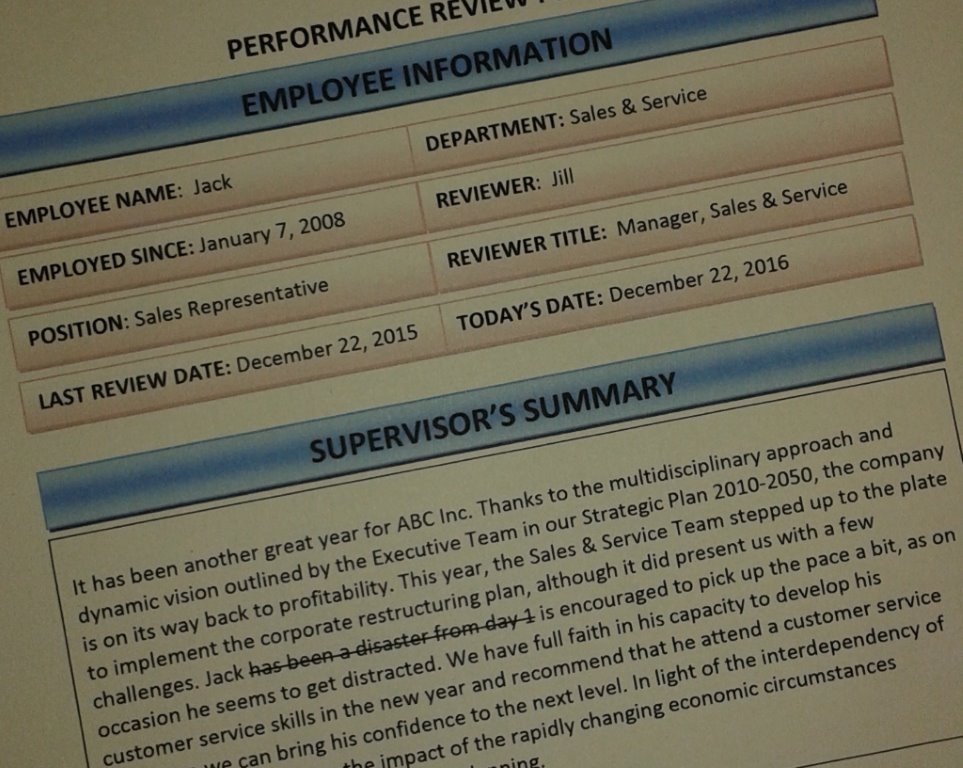
Watching the Clock
Photo credit: Evert Akkerman
The end of the year is usually the season for all kinds of joyful stuff, and in many organizations this includes performance reviews. You know, the annual ritual dance that most participants dread – appraisers as well as appraisees – as it tends to represent a lot of movement and little progress. In this sense, the process is perfectly tailored to those in supervisory positions who mistake movement for progress and being present for being productive. Well, movement isn’t necessarily progress, and a lack of movement isn’t necessarily laziness. A friend of mine used to nap at his desk after lunch and his coworkers would always leave him be, as he often woke up with a great idea.
Appraisal season tends to be a time of sweetness and light, as this is when serious issues are sugar-coated, real differences papered-over and poor performance excused. This way, everyone can sail into a blissful Christmas with a secure spot on the CEO’s Nice List and then coast into the new year with some residual eggnog buzz. Imagine all the energy being expended on a national scale, year after year, just for the purpose of getting along instead of getting ahead. My all-time favourite was a supervisor who wrote the following under ‘Efficiency’ on a review: ‘We were too busy to do any time management’.
Consider the following statistics:
- 63 % of employees are unhappy in their jobs (Gallup, 2013)
- 68 % of U.S. employees are not engaged or actively disengaged (Gallup, 2015)
- 82 % of managers are miscast in their roles (Gallup, 2015)
When employees are unhappy or not engaged in their work, they are killing time and watching the clock. They’ve checked out, but are still collecting their pay cheques. As my friend Ron pointed out, look at a full commuter train pulling out of a station in the morning, watch it pass and realize that 7 out of 10 people on that train don’t really want to go where they’re headed. How productive would these people be, day in and day out? According to the Canada Human Resources Centre, the annual impact of disengagement on the North American economy is over $350 billion.
And if 8 out of 10 managers have no business being in management, why are they there? According to Gallup, people tend to end up in management because they were successful in a previous non-managerial role, or they had a lot of experience or tenure in their field. It’s the classic example of the Sales Representative being made Sales Manager, or it’s a matter of ‘Joe’s been with us six years and it’s his turn now’. Managing people requires a completely different skill set.
At appraisal time, miscast managers and disengaged employees align their interests. According to Tony Davila, Marc Epstein, Robert Shelton in Making Innovation Work, when supervisors are expected to write comments and make judgment calls, 95 % of employees end up in the top-2 appraisal levels.
Now, if we are ABC Inc. and our goal is to become the best widget producer in Canada, what’s the chance of our achieving this goal when 68 percent of our employees don’t care and 82 % of our managers have no clue how to manage them? Are we to state on our website that we strive for excellence, aim to attract top talent and deliver top-notch customer service, while two thirds of our employees are mailing it in and four fifths of our managers shouldn’t have been hired or promoted in the first place?
Too often, people at all levels in an organization are left alone, marinating in their own shortcomings. Everyone around them knows what’s going on, but pretends that nothing is amiss. No one ever makes a serious effort to provide real feedback or get them out of their role and into a different one, for which they may be much better suited. It’s easier to pretend that all is well, but below the surface, issues fester and resentment grows. As Tangerine’s Peter Aceto said in Weology, ‘The top performers know exactly who the poor performers are, and it kills them to see their leaders allowing poor performance to continue’.
In terms of addressing the issue, HR has a critical role in inserting accountability into the process. When a manager has three consecutive annual reviews in which a lack of management skills is highlighted, it doesn’t make much sense to put that manager in charge of additional reports or a bigger department. With support from the executive, HR needs to make sure that promotions are based on real data and that supervisors are hired and trained to address and document issues and provide meaningful feedback to their direct reports.
Just going through the motions isn’t good enough. This is serious stuff, with a real impact on the bottom line. We have to make the appraisal process consequential. Following up on personal goals and targets that were set in the beginning of the year and connecting outcomes to compensation and promotions is crucial for the integrity, value and validity of the appraisal process. Also, when management positions need to be filled, we need to hire or promote people who have the right skills, as well as credibility. If participants perceive the process as meaningful, organizations will have a much better shot at aligning behaviours with their mission and objectives.









